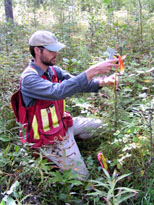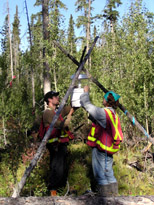Research Objectives
 EMEND takes an ecological systems approach to central questions about forest management through multidisciplinary inquiry. Our work seeks to determine how practical forest harvest and regenerative practices can best maintain biotic communities, spatial patterns of forest structure and functional ecosystem integrity in comparison with mixed-wood landscapes that have originated through wildfire and other inherent natural disturbances. A great variety of research is coordinated on a single land base to promote integration as we observe, document and interpret information on forest management trade-offs (e.g. productivity vs. biodiversity, silvicultural costs vs. incremental harvesting costs, etc.).
EMEND takes an ecological systems approach to central questions about forest management through multidisciplinary inquiry. Our work seeks to determine how practical forest harvest and regenerative practices can best maintain biotic communities, spatial patterns of forest structure and functional ecosystem integrity in comparison with mixed-wood landscapes that have originated through wildfire and other inherent natural disturbances. A great variety of research is coordinated on a single land base to promote integration as we observe, document and interpret information on forest management trade-offs (e.g. productivity vs. biodiversity, silvicultural costs vs. incremental harvesting costs, etc.).
There are three principal components to EMEND field research:
- Collection of experiment-wide or “Core” data, done primarily by the centralized research group (“Core Crew”), as required to ensure that comparisons of all treatments can be made over all 4 forest types. Much of this research is focused on collecting data related to the general response of the forest ecosystem following harvest (i.e. tree growth and yield, deadwood dynamics, biomass estimates).
- Research planned and executed by researchers interested in using the EMEND site as a template for their work. Work carried out under this category is comprised mostly of projects by graduate students and by research scientists interested in questions other than the experiment-wide questions addressed in the core research.
- Research taking EMEND results and testing them at the landscape level.
 The research effort to date has involved over 30 researchers, 45 graduate students and over 100 undergraduate students from six universities (University of Alberta, University of Calgary, University of British Columbia, University of Minnesota, University of Lethbridge, Laval University), FERIC and both provincial (ARC) and federal (CFS) research units. It is anticipated that developing connections will lead to the participation of additional researchers from other universities, including University of Northern British Columbia and Université du Québec à Montréal. Through strong connections with researchers from the CFS, we will be able to link to several national research networks comprised of scientists known internationally for forest research.
The research effort to date has involved over 30 researchers, 45 graduate students and over 100 undergraduate students from six universities (University of Alberta, University of Calgary, University of British Columbia, University of Minnesota, University of Lethbridge, Laval University), FERIC and both provincial (ARC) and federal (CFS) research units. It is anticipated that developing connections will lead to the participation of additional researchers from other universities, including University of Northern British Columbia and Université du Québec à Montréal. Through strong connections with researchers from the CFS, we will be able to link to several national research networks comprised of scientists known internationally for forest research.
The main research components for the EMEND study are:
- Biodiversity monitoring
- Forest productivity
- Forest ecosystem processes and patterns
- Silviculture systems
- Forest fire ecology
- Soils and nutrient cylcing
- Forest hydrology and microclimate
- Tree genetics
- Socio-economics / harvesting cost analysis
Affiliated research: Research projects that include a component part conducted at EMEND
- Dr. Charles Nock: NSERC Industrial Research Chair in Ecosystem-based Forest Management
- SmartForests Canada: A Canada-wide project addressing issues of forest management under environmental change. A series of monitoring plots has been established at EMEND.
